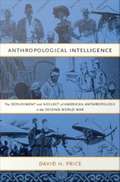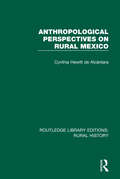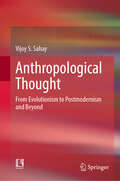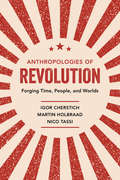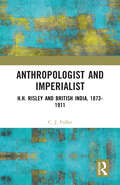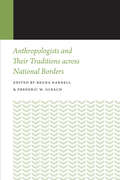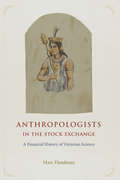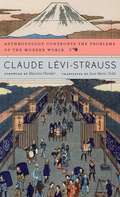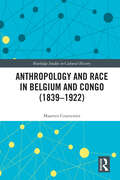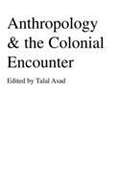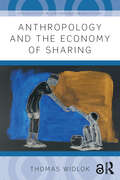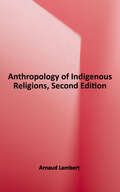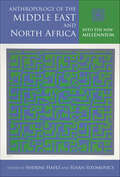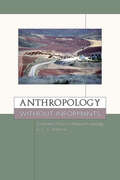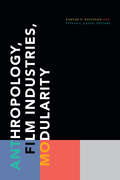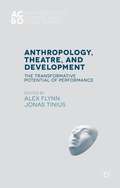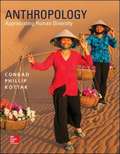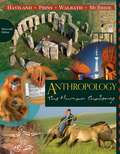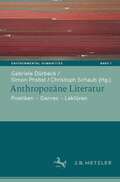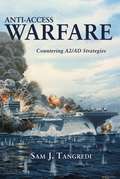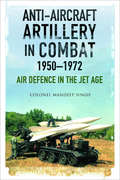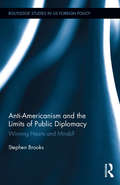- Table View
- List View
Anthropological Intelligence: The Deployment and Neglect of American Anthropology in the Second World War
by David H. PriceBy the time the United States officially entered World War II, more than half of American anthropologists were using their professional knowledge and skills to advance the war effort. The range of their war-related work was extraordinary. They helped gather military intelligence, pinpointed possible social weaknesses in enemy nations, and contributed to the army's regional Pocket Guide booklets. They worked for dozens of government agencies, including the Office of Strategic Services (OSS) and the Office of War Information. At a moment when social scientists are once again being asked to assist in military and intelligence work, David H. Price examines anthropologists' little-known contributions to the Second World War. Anthropological Intelligence is based on interviews with anthropologists as well as extensive archival research involving many Freedom of Information Act requests. Price looks at the role played by the two primary U. S. anthropological organizations, the American Anthropological Association and the Society for Applied Anthropology (which was formed in 1941), in facilitating the application of anthropological methods to the problems of war. He chronicles specific projects undertaken on behalf of government agencies, including an analysis of the social effects of postwar migration, the design and implementation of OSS counterinsurgency campaigns, and the study of Japanese social structures to help tailor American propaganda efforts. Price discusses anthropologists' work in internment camps, their collection of intelligence in Central and South America for the FBI's Special Intelligence Service, and their help forming foreign language programs to assist soldiers and intelligence agents. Evaluating the ethical implications of anthropological contributions to World War II, Price suggests that by the time the Cold War began, the profession had set a dangerous precedent regarding what it would be willing to do on behalf of the U. S. government.
Anthropological Perspectives on Rural Mexico (Routledge Library Editions: Rural History #8)
by Cynthia Hewitt AlcántaraIn this title, first published in 1984, the author examines the social and political forces surrounding the practice of anthropology at different periods in the history of Mexico since 1917. She does this by analysing and tracing the development of competing anthropological perspectives, from ethnographic particularism and functionalism through indigenismo, cultural ecology, Marxism and the dependency paradigm, to the historical structuralism of the 1970s. This book provides the basis for a systematic analysis of peasant studies in Mexico, and discusses in stimulating terms the theoretical and empirical difficulties of the profession of anthropology itself.
Anthropological Thought: From Evolutionism to Postmodernism and Beyond
by Vijoy S. SahayThe volume explores how anthropological ideas emerged. First, in the writings of the ancient Greek and Roman philosophers; after that, by the Renaissance scholars during the 18th century in Europe; and finally, during the mid-19th century, especially after Charles Darwin's theory of biological evolution. It covers the contributions of all the evolutionists of the 19th century. It explores the evolution of anthropological schools, from 'Evolutionism' to 'Diffusionism' and beyond. It also discusses diverse perspectives, such as 'Historical and Dialectical Materialism,' 'Functionalism,' 'Structural-Functionalism,' 'Cultural Ecology,' and 'Cognitive Anthropology. Concepts like Ethnocentrism and culture provide a rich tapestry of anthropological thought. It discusses the lives and contributions of renowned anthropologists, from E.B. Tylor to Michel Foucault and Jacques Derrida. This book is a valuable resource for students, researchers, and instructors in social sciences, offering a nuanced understanding of anthropology, sociology, and psychology.
Anthropologies of Revolution: Forging Time, People, and Worlds
by Martin Holbraad Igor CherstichA free open access ebook is available upon publication. Learn more at www.luminosoa.org. What can anthropological thinking contribute to the study of revolutions? The first book-length attempt to develop an anthropological approach to revolutions, Anthropologies of Revolution proposes that revolutions should be seen as concerted attempts to radically reconstitute the worlds people inhabit. Viewing revolutions as all-embracing, world-creating projects, the authors ask readers to move beyond the idea of revolutions as acts of violent political rupture, and instead view them as processes of societal transformation that penetrate deeply into the fabric of people’s lives, unfolding and refolding the coordinates of human existence.
Anthropologist and Imperialist: H.H. Risley and British India, 1873-1911
by C. J. FullerSir Herbert Hope Risley (1851 - 1911) - 'H. H. Risley', as he always signed himself - was a member of the Indian Civil Service (ICS) from 1873 to 1910 who served in Bengal and became a senior administrator and policymaker in the colonial government, as well as the pre-eminent anthropologist in British India. He was also an imperialist, who was convinced of the rightness of 'civilising' British rule and its benefits for both India and Britain, and one of this book's objectives is to render his simultaneous commitment to anthropology and imperialism intelligible to present-day readers. More specifically, Anthropologist and Imperialist: H. H. Risley and British India, 1873–1911 documents the two sides of Risley’s career, which is used as a case-study to investigate, first, the production and circulation of colonial knowledge, specifically anthropological knowledge, and secondly, its often loose and inconsistent connection with administration and policymaking, and with the government and state overall. Risley, like other officials engaged in anthropology in India, as well as the government itself, insisted that ethnography and anthropology had both ‘administrative’ and ‘scientific’ value; unlike previous works on Indian colonial anthropology, this book carefully examines its ‘scientific’ contributions in relation to contemporary metropolitan anthropology. It does not attempt to reinvent ‘greatman’ political or intellectual history, but does demonstrate the importance of studying the powerful officials who ruled British India, as well as the minor provincial politicians and subaltern subjects – or the abstract forces, such as colonialism and resistance – that have dominated recent historical scholarship. This book shows, too, that a detailed inquiry into Risley’s career, and his ideas and actions, can open new perspectives on a variety of continuing debates, including those over the colonial construction of caste and race in ‘traditional’ India, orientalism and forms of colonial knowledge, Victorian anthropology’s close relationship with the British empire, and the modern discipline’s uneasy links with its colonial past. Print edition not for sale in South Asia (India, Sri Lanka, Nepal, Bangladesh, Pakistan and Bhutan)
Anthropologists and Their Traditions across National Borders (Histories of Anthropology Annual)
by Regna Darnell Frederic W. GleachVolume 8 of the Histories of Anthropology Annual series, the premier series published in the history of the discipline, explores national anthropological traditions in Britain, the United States, and Europe and follows them into postnational contexts. Contributors reassess the major theorists in twentieth-century anthropology, including the work of luminaries such as Franz Boas, Claude Lévi-Strauss, Bronisław Malinowski, A. R. Radcliffe-Brown, and Marshall Sahlins, as well as lesser-known but important anthropological work by Berthold Laufer, A. M. Hocart, Kenelm O. L. Burridge, and Robin Ridington, among others.These essays examine myriad themes such as the pedagogical context of the anthropologist as a teller of stories about indigenous storytellers; the colonial context of British anthropological theory and its projects outside the nation-state; the legacies of Claude Lévi-Strauss’s structuralism regarding culture- specific patterns; cognitive universals reflected in empirical examples of kinship, myth, language, classificatory systems, and supposed universal mental structures; and the career of Marshall Sahlins and his trajectory from neo-evolutionism and structuralism toward an epistemological skepticism of cross- cultural miscommunication.
Anthropologists and the Rediscovery of America, 1886-1965
by John S. GilkesonThis book examines the intersection of cultural anthropology and American cultural nationalism from 1886, when Franz Boas left Germany for the United States, until 1965, when the National Endowment for the Humanities was established. Five chapters trace the development within academic anthropology of the concepts of culture, social class, national character, value, and civilization, and their dissemination to non-anthropologists. As Americans came to think of culture anthropologically, as a "complex whole" far broader and more inclusive than Matthew Arnold's "the best which has been thought and said," so, too, did they come to see American communities as stratified into social classes distinguished by their subcultures; to attribute the making of the American character to socialization rather than birth; to locate the distinctiveness of American culture in its unconscious canons of choice; and to view American culture and civilization in a global perspective.
Anthropologists in the Stock Exchange: A Financial History of Victorian Science
by Marc FlandreauUncovering strange plots by early British anthropologists to use scientific status to manipulate the stock market, Anthropologists in the Stock Exchange tells a provocative story that marries the birth of the social sciences with the exploits of global finance. Marc Flandreau tracks a group of Victorian gentleman-swindlers as they shuffled between the corridors of the London Stock Exchange and the meeting rooms of learned society, showing that anthropological studies were integral to investment and speculation in foreign government debt, and, inversely, that finance played a crucial role in shaping the contours of human knowledge. Flandreau argues that finance and science were at the heart of a new brand of imperialism born during Benjamin Disraeli’s first term as Britain’s prime minister in the 1860s. As anthropologists advocated the study of Miskito Indians or stated their views on a Jamaican rebellion, they were in fact catering to the impulses of the stock exchange—for their own benefit. In this way the very development of the field of anthropology was deeply tied to issues relevant to the financial market—from trust to corruption. Moreover, this book shows how the interplay between anthropology and finance formed the foundational structures of late nineteenth-century British imperialism and helped produce essential technologies of globalization as we know it today.
Anthropology Confronts the Problems of the Modern World
by Claude Levi-StraussAnthropology Confronts the Problems of the Modern World is the first English translation of a series of lectures Claude Lévi-Strauss delivered in Tokyo in 1986. Written with an eye toward the future as his own distinguished career was drawing to a close, this volume presents a synthesis of the author’s major ideas about structural anthropology, a field he helped establish. Critiquing insights of his earlier writings on the relationship between race, history, and civilization, Lévi-Strauss revisits the social issues that never ceased to fascinate him. He begins with the observation that the cultural supremacy enjoyed by the West for over two centuries is at an end. Global wars and genocides in the twentieth century have fatally undermined Western faith in humanity’s improvement through scientific progress. Anthropology, however, can be the vehicle of a new “democratic humanism,” broadening traditional frameworks that have restricted cross-cultural understandings of the human condition, and providing a basis for inquiries into what other civilizations, such as those of Asia, can teach. Surveying a world on the brink of the twenty-first century, Lévi-Strauss assesses some of the dilemmas of cultural and moral relativism a globalized society faces-ethical dimensions of economic inequality, the rise of different forms of religious fundamentalism, the promise and peril of genetic and reproductive engineering. A laboratory of thought opening onto the future, Anthropology Confronts the Problems of the Modern World is an important addition to the canon of one of the twentieth-century’s most influential theorists.
Anthropology and Race in Belgium and the Congo (Routledge Studies in Cultural History)
by Maarten CouttenierThis books examines the history of Belgian physical anthropology in the long nineteenth century and discusses how the notion of ‘race’ structured Belgian pasts and presents as well as relations between metropole and empire. In a context of competing European nationalisms, Belgian anthropologists mainly used physical characters, like skull form and the color of hair and eyes, to delimitate ‘races’, which were believed to be permanent and existent. Their belief in a supposed racial superiority was however above all telling about their own origins and physical characters. Although it is often assumed that these ideas were subsequently transferred to the colony, the case of Belgian colonization in Congo shows that colonial administrators, at least in theory, were reluctant to use the idea of permanent ‘races’ because they needed the possibility of ‘evolution’ to legitimize their actions as part of a ‘civilizing mission’. In reality, however, colonization was based on military occupation and economic exploitation, with devastating effects. This book analyzes how, in this violent context, widespread racial prejudices in fact dehumanized Congolese. This not only allowed colonizers to act inhuman but also reduced Congolese, or their body parts, to objects that could be measured, photographed, casted, and ‘collected’. This volume will be of use to students and scholars alike interested in social and cultural history as well as imperial and colonial history.
Anthropology and the Colonial Encounter
by Talal AsadThe papers in this book analyze and document ways in which anthropological thinking and practice have been affected by British colonialism. They approach this topic from different points of view and at different levels. Each stands as an original contribution to an argument which is only just beginning.
Anthropology and the Economy of Sharing (Critical Topics in Contemporary Anthropology)
by Thomas WidlokThis book examines the economy of sharing in a variety of social and political contexts around the world, with consideration given to the role of sharing in relation to social order and social change, political power, group formation, individual networks and concepts of personhood. Widlok advocates a refreshingly broad comparative approach to our understanding of sharing, with a rich range of material from hunter-gatherer ethnography alongside debates and empirical illustrations from globalized society, helping students to avoid Western economic bias in their thinking. Anthropology and the Economy of Sharing also demonstrates that sharing is distinct from gift-giving, exchange and reciprocity, which have become dominant themes in economic anthropology, and suggests that a new focus on sharing will have significant repercussions for anthropological theory. Breaking new ground in this key topic, this volume provides students with a coherent and accessible overview of the economy of sharing from an anthropological perspective.
Anthropology and the Economy of Sharing (Critical Topics in Contemporary Anthropology)
by Thomas WidlokThis book examines the economy of sharing in a variety of social and political contexts around the world, with consideration given to the role of sharing in relation to social order and social change, political power, group formation, individual networks and concepts of personhood. Widlok advocates a refreshingly broad comparative approach to our understanding of sharing, with a rich range of material from hunter-gatherer ethnography alongside debates and empirical illustrations from globalized society, helping students to avoid Western economic bias in their thinking. Anthropology and the Economy of Sharing also demonstrates that sharing is distinct from gift-giving, exchange and reciprocity, which have become dominant themes in economic anthropology, and suggests that a new focus on sharing will have significant repercussions for anthropological theory. Breaking new ground in this key topic, this volume provides students with a coherent and accessible overview of the economy of sharing from an anthropological perspective.The Open Access version of this book, available at http://www.taylorfrancis.com, has been made available under a Creative Commons Attribution-ShareAlike (CC BY-SA) 4.0 license. Open Access funding of this book was made possible through the Leo Spitzer Prize of the University of Cologne. This generous funding is gratefully acknowledged.
Anthropology of Indigenous Religions, Second Edition
by Arnaud LambertThe second edition of the Anthropology of Indigenous Religions continues to offer a novel introduction to the ways that anthropologists investigate indigenous religions. The anthropological approach to the study of religion can be viewed as a series of exchanges and debates spanning almost two centuries regarding the nature of religions and its place in human life. This book invites readers to take part in these ongoing conversations while exploring the main elements of the religious life in small-scale societies around the world. New features of the second edition include: - Greater emphasis on both classic and modern anthropological approaches to animism, shamanism, totemism, magic, and witchcraft - Additional topics such as astrology, healers and magical medicine, merit and karma - Revised and expanded treatments of ancestor veneration, soul beliefs, high gods, cosmology, eschatology, religious symbolism, religious objects, shamanism, and magic among others - New charts and graphics to help readers better understand different religious concepts and their anthropological interpretations - New and revised learning activities to help readers engage with the material in the book - Guides to recommended readings for each topic - References to the companion volume, indigenous religions of the world (Lambert 2019), to help readers interpret the ethnographic data presented in that book. Also includes KHQ, a study app that provides students with a variety of study tools that are customized to their course.
Anthropology of the Middle East and North Africa: Into the New Millennium (Public Cultures Of The Middle East And North Africa Ser.)
by Sherine Hafez and Susan SlyomovicsThis volume combines ethnographic accounts of fieldwork with overviews of recent anthropological literature about the region on topics such as Islam, gender, youth, and new media. It addresses contemporary debates about modernity, nation building, and the link between the ideology of power and the production of knowledge. Contributors include established and emerging scholars known for the depth and quality of their ethnographic writing and for their interventions in current theory.
Anthropology without Informants: Collected Works in Paleoanthropology by L.G. Freeman
by L. G. FreemanL.G. Freeman is a major scholar of Old World Paleolithic prehistory and a self-described “behavioral paleoanthropologist.” Anthropology without Informants is a collection of previously published papers by this preeminent archaeologist, representing a cross section of his contributions to Old Work Paleolithic prehistory and archaeological theory. A socio-cultural anthropologist who became a behavioral paleoanthropologist late in his career, Freeman took a unique approach, employing statistical or mathematical techniques in his analysis of archaeological data. All the papers in this collection blend theoretical statements with the archeological facts they are intended to help the reader understand. Although he taught at the University of Chicago for the span of his 40-year career, Freeman is not well-known among Anglophone scholars, because his primary fieldwork and publishing occurred in Cantabrian, Spain. However, he has been a major player in Paleolithic prehistory, and this volume will introduce his work to more American Archaeologists. This collection brings the work of an expert scholar, to a broad audience, and will be of interest to archaeologists, their students, and lay readers interested in the Paleolithic era.
Anthropology, Film Industries, Modularity
by Ramyar D. Rossoukh and Steven C. CatonFrom Bangladesh and Hong Kong to Iran and South Africa, film industries around the world are rapidly growing at a time when new digital technologies are fundamentally changing how films are made and viewed. Larger film industries like Bollywood and Nollywood aim to attain Hollywood's audience and profitability, while smaller, less commercial, and often state-funded enterprises support various cultural and political projects. The contributors to Anthropology, Film Industries, Modularity take an ethnographic and comparative approach to capturing the diversity and growth of global film industries. They outline how modularity—the specialized filmmaking tasks that collectively produce a film—operates as a key feature in every film industry, independent of local context. Whether they are examining the process of dubbing Hollywood films into Hindi, virtual reality filmmaking in South Africa, or on-location shooting in Yemen, the contributors' anthropological methodology brings into relief the universal practices and the local contingencies and deeper cultural realities of film production.Contributors. Steven C. Caton, Jessica Dickson, Kevin Dwyer, Tejaswini Ganti, Lotte Hoek, Amrita Ibrahim, Sylvia J. Martin, Ramyar D. Rossoukh
Anthropology, Theatre, and Development
by Alex Flynn Jonas TiniusFrom Pussy Riot and the Arab Spring to Italian mafia dance, this collection provides an interdisciplinary analysis of relational reflexivity in political performance. By putting anthropological theory into dialogue with international development scholarship and artistic and activist practices, this book highlights how aesthetics and politics interrelate in precarious spheres of social life. The contributors of this innovative interdisciplinary volume raise questions about the transformativepotential of participating in and reflecting upon political performances both as individual and as collectives. They also argue that such processes provide a rich field and new pathways for anthropological explorations of peoples' own reflections on humanity, sociality, change, and aspiration. Reflecting on political transformations through performance puts centre stage the ethical dimensions of cultural politics and how we enact political subjectivity.
Anthropology: Appreciating Human Diversity
by Conrad Phillip KottakA leading name in anthropology, Conrad Philip Kottak continues to define student learning in the general anthropology course. Anthropology: Appreciating Human Diversity offers an up-to-date holistic introduction to general anthropology from the four-field perspective. Key themes of appreciating the experiences students bring to the classroom, appreciating human diversity, and appreciating the field of anthropology are showcased throughout the text. Focusing on an increasingly interconnected world, the new Focus on Globalization essays examine topics as diverse as tourism in the ancient and modern worlds, global disease pandemics, world events (including the Olympics and the World Cup), and the expansion of international finance and branding. Connect is the only integrated learning system that empowers students by continuously adapting to deliver precisely what they need, when they need it, and how they need it, so that your class time is more engaging and effective.
Anthropology: The Human Challenge
by William A. Haviland Harald E. L. Prins Bunny Mcbride Dana WalrathThis book offers a comprehensive and balanced presentation on views of human culture, evolution, and prehistory. The text presents the principles and processes of anthropology, both physical (biological) and cultural, including ethnology, linguistics, and prehistoric archaeology in an integrated, holistic manner. The book's framework emphasizing the challenge of human survival, the connections between biology and culture, and the impact of globalization on peoples and cultures around the world, serves to unify the material. The authors integrate contemporary research and ideas from several schools of thought, and use a lively writing style to engage readers and keep them interested in "real world" anthropology.
Anthropozäne Literatur: Poetiken – Themen – Lektüren (Environmental Humanities #1)
by Gabriele Dürbeck Simon Probst Christoph SchaubDer sich seit 2000 etablierende Anthropozän-Diskurs begreift die Menschheit als geophysikalische Kraft. Wesentliche Strukturmerkmale dieses Diskurses und seiner Narrative sind das Einnehmen einer planetarischen Perspektive auf die globale Umweltkrise, eine tiefenzeitlich konstituierte Historizität, die Annahme unauflösbarer Wechselbeziehungen von Natur und Kultur und das Thematisieren ethischer Verantwortung des Menschen für das Erdsystem. Die literaturwissenschaftliche Forschung hat in den letzten Jahren das Anthropozän als geologisches sowie kulturelles Konzept aufgenommen und spricht zunehmend häufiger von ‚anthropozäner‘ Literatur. Der vorliegende Band mit 15 Beiträgen und einer Einleitung, die das Feld erstmals vermisst, stellt einen innovativen Versuch in der deutschsprachigen Forschungslandschaft dar, Ansätze zusammenzutragen, die die Rede von einer Anthropozän-Literatur in diesem entstehenden Forschungsfeld präzisieren, systematisieren und kritisch befragen. Dabei geht es um mögliche Poetiken und Genres. In Fallstudien (‚Lektüren‘) werden mögliche anthropozäne Lesarten ausprobiert.
Anti-Access Warfare
by Sam TangrediThe book is the definitive conceptual and historical introduction to the concept of anti-access strategies. Unlike current studies, it is not simply technology focused. Nor is it primarily intended as critique of the current Air-Sea Battle concept. It combines conceptual thinking with historical examples and potential scenarios in order to identify options for future defense planning.Strategies of "anti-access," also known as "area denial" (more recently combined into the awkward acronym "A2/AD") are presumed to be the primary threats to the employment of U.S. military forces in overseas crises. This presumption has gradually evolved into a joint concept of "operational access." Anti-access capabilities appear to be the current military posture of the People's Republic of China and Islamic Republic of Iran. The study of anti-access or area denial strategies for use against American power projection capabilities has strong naval roots-which have been largely ignored by the most influential commentators. In reality, denial of access was the Soviet Navy's operational objective during the Cold War. The first use of the actual anti-access term can be traced to a series of "anti-Navy" studies by the Office of Net Assessment designed to examine the ability of the U.S. Navy to carry out its Maritime Strategy and, later, "...From the Sea" strategic vision. Sustained long-range power projection is both a unique strength of U.S. military forces and a requirement for an activist foreign policy and forward defense. In more recent years, the logic of the anti-access approach has been identified by the Department of Defense as a threat to this U.S. capability and the joint force; countering it is one of the defense priorities identified in the President's directions issued this past January. In addition to potential regional powers, a number of think-tanks have suggested that non-state actors, such as terrorist organizations, are developing anti-access/area denial capabilities.The book's conclusions differ from most commentary on anti-access. Rather than a technology-driven post-Cold War phenomenon, the anti-access approach has been a routine element of grand strategy used by strategically weaker powers to confront stronger powers throughout history. But they have been largely unsuccessful when confronting a stronger maritime power. Although high technology weapons capabilities enhance the threat, they also can be used to mitigate the threat. Rather than arguing against reliance on maritime forces-presumably because they are no longer survivable-the historical analysis argues that maritime capabilities are key in "breaking the great walls."
Anti-Aircraft Artillery in Combat, 1950–1972: Air Defence in the Jet Age
by Colonel Mandeep SinghAn in-depth look at the combat performance of ground-based air defenses during the Korean War, Vietnam War, Middle East conflicts, and other campaigns. Though anti-aircraft artillery was extensively used in combat in the First World War, it wasn&’t until World War II that it came into prominence, shooting down more aircraft than any other weapon and seriously degrading the conduct of air operations. In the battle between the attackers and anti-aircraft artillery, the latter had the upper hand when the war ended. The post-war years saw a decline in anti-aircraft artillery as peace prevailed, and the advent of the jet aircraft seemed to tilt the balance in favor of the aircraft as they flew faster and higher, seemingly beyond the reach of anti-aircraft artillery. It would take all the hi-tech equipment and the guile and cunning that anti-aircraft artillery could muster to try and reclaim pole position. It is that story, of the tug of war between the aircraft and artillery, that forms the narrative of this book—as it traces the history of combat employment of anti-aircraft artillery from the Korean War, in effect the first Jet Age war, to the War of Attrition between Arab states and Israel when the missiles came of age, sending the aircraft scurrying for cover. Mandeep Singh&’s book is the first attempt to look at the performance of anti-aircraft artillery, incorporating the views, analyses and experiences of Soviet, Arab and South Asian Armies through the major wars between 1950 and 1972.
Anti-Americanism and the Limits of Public Diplomacy: Winning Hearts and Minds? (Routledge Studies in US Foreign Policy)
by Stephen BrooksContrary to the view held by many who study American foreign policy, public diplomacy has seldom played a decisive role in the achievement of the country's foreign policy objectives. The reasons for this are not that the policies and interventions are ill-conceived or badly executed, although this is sometimes the case. Rather, the factors that limit the effectiveness of public diplomacy lie almost entirely outside the control of American policy-makers. In particular, the resistance of foreign opinion-leaders to ideas and information about American motives and actions that do not square with their pre-conceived notions of the United States and its activities in the world is an enormous and perhaps insurmountable wall that limits the impact of public diplomacy. This book does not conclude that public diplomacy has no place in the repertoire of American foreign policy. Instead, the expectations held for this soft power tool need to be more realistic. Public diplomacy should not be viewed as a substitute for hard power tools that are more likely to be correlated with actual American influence as opposed to the somewhat nebulous concept of American standing.
Anti-Americanism in European Literature (Studies in European Culture and History)
by Jesper GulddalPursues the hypothesis that fictional literature has been instrumental in the development and dissemination of European anti-Americanism from the early 1800s to today. Focusing on Britain, France and Germany, it offers analyses of a range of canonical literary works in which resentful hostility towards the United States is a predominant feature.
